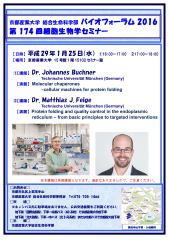総合生命科学部 バイオフォーラム2016開催(1月25日)
2017.01.13
総合生命科学部 バイオフォーラム2016/第174回細胞生物学セミナー
最先端の生命科学研究に触れてみませんか
第1部:Dr. Johannes Buchner (Technische Universität München / Germany)
「Molecular chaperones - cellular machines for protein folding」
Cells have developed a quality control system that ensures that the cellular proteome folds correctly, keeps its native conformation and that unproductive side reactions are prevented.. This is especially important under stress conditions such as high temperature when massive protein unfolding occurs or in the context of diseases when the cellular protein homeostasis is out of control.
The key elements of the cellular stress defense system are molecular chaperones. These cellular machines of protein folding share the remarkable ability of specifically recognizing non-native proteins and assisting their folding to the native state. There are several classes of molecular chaperones that evolved independently and are both structurally and mechanistically not related, such as the small heat shock proteins, Hsp70 and Hsp90. Progress in recent years based on a combination of different experimental approaches provided insight into the mechanistic principles of chaperones. With a view to define the key traits of different chaperone machines, we set out to reconstitute their mode of action using purified components. Our analysis reveals intriguing differences in the mode of action including sophisticated regulatory and control elements.
| 「分子シャペロン:タンパク質の品質管理機構」 細胞には、タンパク質が正常に機能し、異常な毒性を発揮しないように監視・管理するシステムが備わっている。その中心を占める多彩な因子群は分子シャペロンと呼ばれ、低分子量熱ショックタンパク質、Hsp70、Hsp90などが知られている。これらの独自に進化した分子シャペロンネットワークを試験管内で再構成することにより、分子シャペロンシステムの多様な活性と制御メカニズムについて新たな知見が得られつつある。 |
第2部:Dr. Matthias J. Feige (Technische Universität München / Germany)
「Protein folding and quality control in the endoplasmic reticulum - from basic principles to targeted interventions」
Approximately one third of all human proteins are produced in the endoplasmic reticulum (ER). These proteins co-translationally enter the ER and have to acquire their native structure, often including oligomerization, before traversing further along the secretory pathway. A dedicated quality control machinery exists within the ER that aids and controls protein folding. Failures in this process are associated with numerous human diseases, including the steadily increasing number of protein folding diseases.
In our work we use an interdisciplinary approach from biochemistry via structural biology to mammalian cell biology to dissect molecular mechanisms and the cellular machinery of protein folding in the ER. A particular focus of our work lies on understanding structural features within client proteins that are recognized by the ER quality control machinery to provide insights into how the cell distinguishes between mature and improperly folded proteins. Our model systems are proteins of the immune system, including antibodies, immune receptors and interleukins. As such, insights into the biogenesis of these proteins can have an immediate impact on designing better biopharmaceuticals as well as breaking ground for novel approaches in human immunotherapy. At the same time, our work aims at understanding common principles that underlie the quality control of the manifold clients that have to be produced in the ER.
| 「小胞体タンパク質品質管理:基本原理から医療応用まで」 分泌・膜タンパク質は合成と同時に小胞体に輸送され、適切な構造を形成し、機能を発揮する。この過程が何らかの障害を受けることで、多様な疾患につながることが知られている。我々は分泌・膜タンパク質の中でも特に、抗体、免疫受容体、インターロイキンなどをモデルとして、タンパク質がどのように適切に品質管理されるかについて研究を進めている。これらの知見を元に、抗体医療・インターロイキン作製などの効率化が進むことが期待される。 |
| 日時 | 2017年1月25日(水) 第1部 16:00~17:00 第2部 17:00~18:00 ※開場15:45 |
|---|---|
| 場所 | 京都産業大学 15号館1階15102セミナー室 |
| 交通 | ※キャンパス内に駐車場はありません。公共交通機関をご利用ください。 交通アクセス |
| 備考 | 事前申込不要・入場無料・一般の方の参加歓迎 本講演は英語講演となります。通訳はありませんので、ご注意ください。 |
| 主催 | 京都産業大学 総合生命科学部 |

